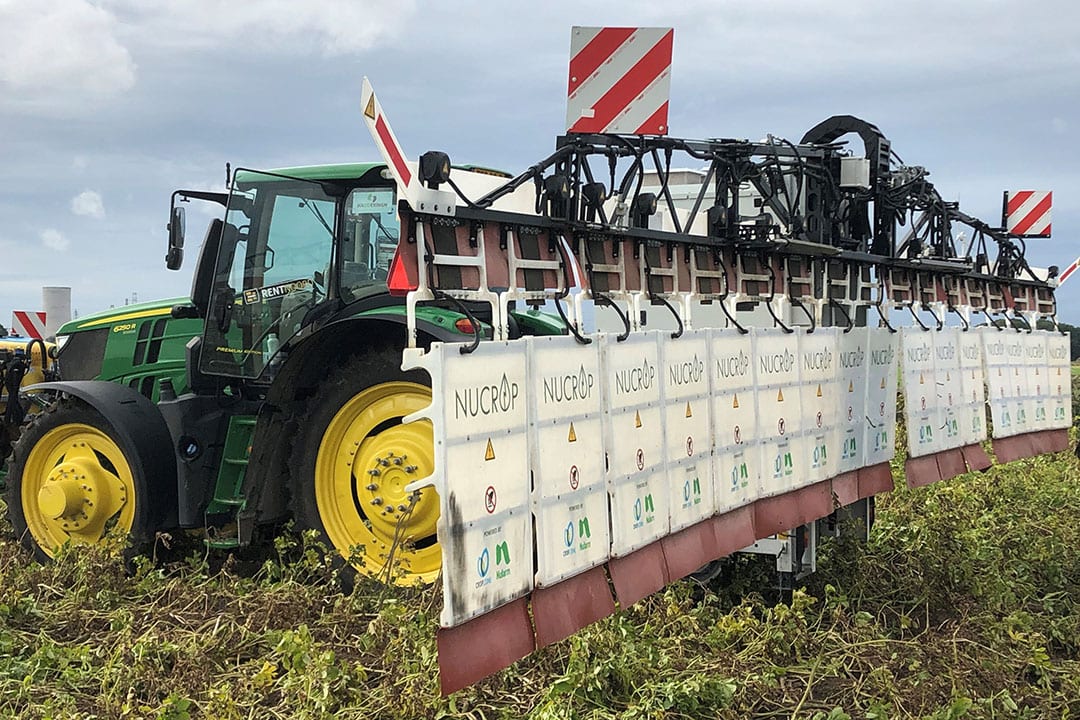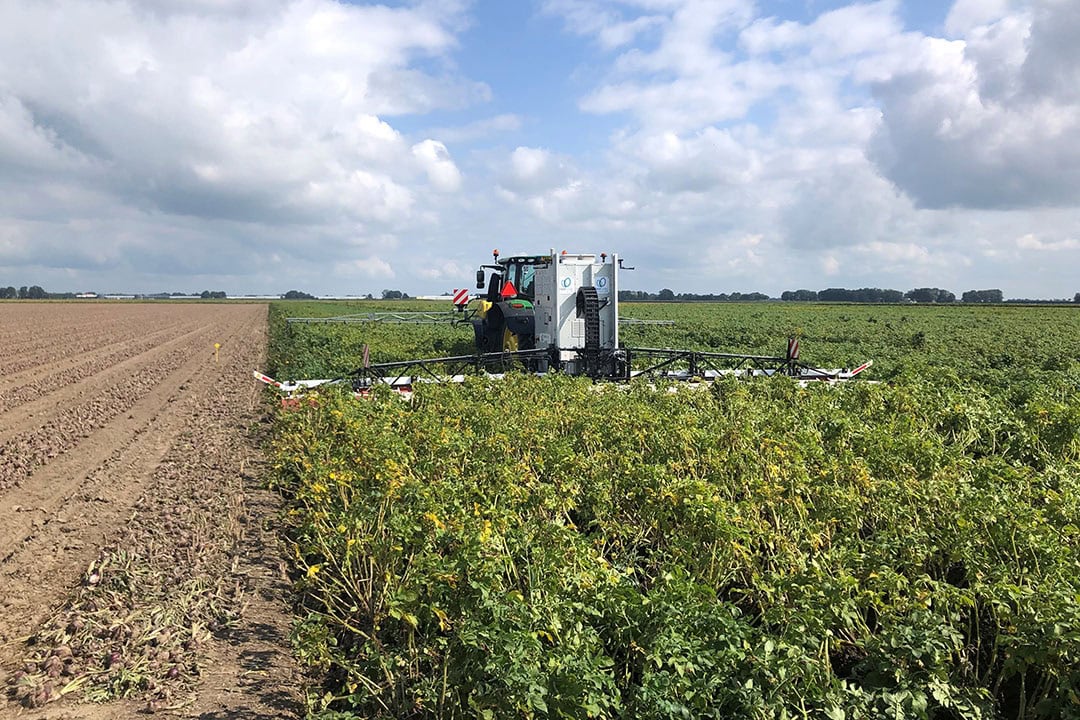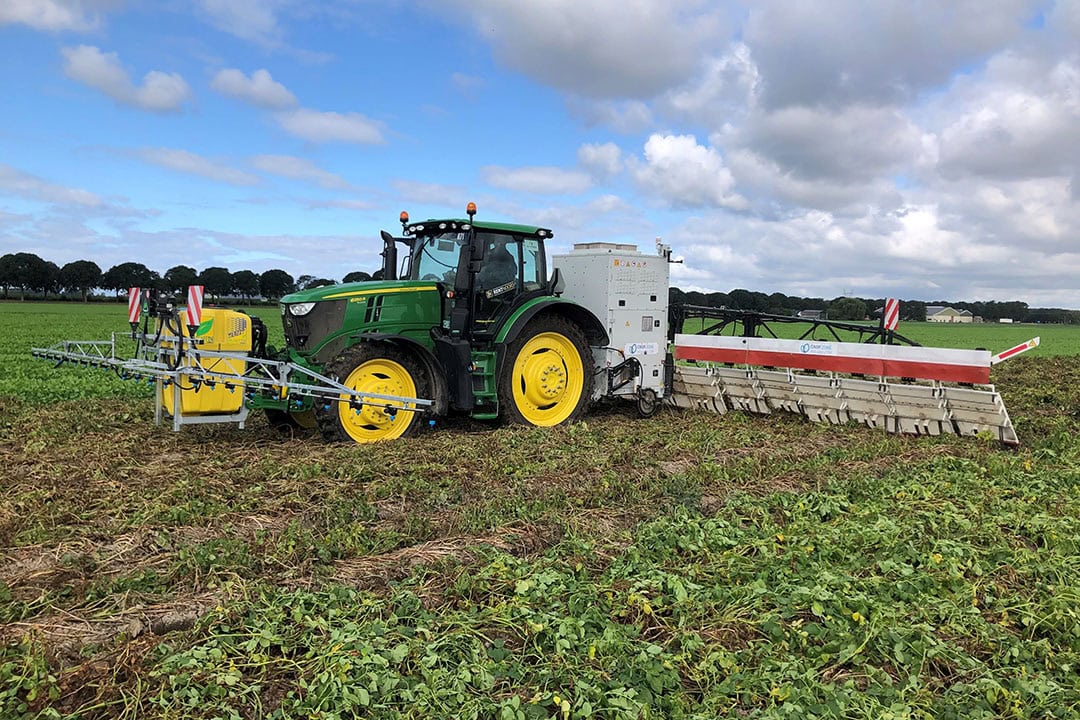Hybrid alternative to herbicides

Since its withdrawal in 2020, potato growers in the EU and UK have been searching for a replacement for Diquat. Trials now show that, out of the three main alternatives, a new hybrid sprayer/electrical system is performing as well, if not better than other chemical and mechanical defoliation options.
With the EU’s aim to cut chemical use by up to 50% by 2030, along with strong pressure on the use of glyphosate, it is also a potential, sustainable alternative to other important non-selective herbicides. Another considerable benefit is there is no risk of chemical residues remaining in the produce.
Nucrop
Called Nucrop the hybrid liquid/electric system was developed by crop.zone, a German ag-tech firm, which is now working with Nufarm, an Australian crop protection company. In 2021 the system picked up two prizes in the Potato Europe Award: A Silver Medal in the Innovation Awards as well as being voted the most innovative new technology for potato production.
While electrical weed desiccation isn’t new, what sets Nucrop apart is its use in conjunction with a conductive liquid pre-treatment. Called ‘Volt.fuel’ this patented non-toxic liquid, contains nitrogen and a phosphate-free mineral. It is applied by a standard, front-mounted sprayer and is currently undergoing the legal approval process for use by organic growers.
Wetting the plant with normal fresh water alone is not effective. This is because water does not have high conductivity and does not wet plants well. It also helps if the wax layers are softened and the liquid keeps the applicators clean.
Text continues below video
Conductive fluid is the key
The conductive fluid’s key attribute is its ability to reduce electrical resistance, which greatly increases efficiency. For potatoes, 10 litre/ha is diluted in water and applied at a rate of 300 litres/ha, working at a forward speed of up to 8km/h.
Power from the tractor’s PTO delivers 140kW (187hp) to drive a generator that converts mechanical energy into a 112kW three-phase electrical supply. A transformer converts this to 2,000V to 5,000V, which is distributed by up to 16, 75cm wide x 1m long units, which contain a set of negative and positive applicators.
Text continues below image

Each applicator unit can deliver up to 7kW, depending on the tractor and electrical conductivity of the plants. If the soil is dry and there are few plants applicators optimise and adjust the power to suit requirements.
By using the conductive liquid pre-treatment Nucrop is able to operate at the considerably lower voltage of between 2,000V to 5,000V, with much less power dissipation compared with other designs, running at between 7,000V to 15,000V. This translates to Nucrop’s treatment requirement of up to 10kW/m compared with between 50kW/m to 65kW/m on the other options.
24m wide version
A 24m wide version is being developed and this year growers in France, Germany and Benelux countries are invited to participate in extensive field testing in the early adopter programme. In addition to potato desiccation, testing and development is underway for other applications such as inter-cropping, pre-seeding, inter-row weed control, post-harvest use as well as weed control on railway lines.
Click here to join the early adopter programme contact.
Nucrop’s potential has been recognised by John Deere, which has recently added crop.zone as a partner in its 2022 Start-up Collaborator programme.
Text continues below image

Other considerations
For growers looking to replace Diquat, the concern is not just to effectively destroy the haulm (tops), but also ensure plant death happens quickly to maintain tuber firmness, avoid vascular browning and other damage. Delays to burn down can also risk a late blight infection or virus transmission by aphids attracted to any remaining green material.
With flail topping there is a concern, particularly from seed potato growers, it can spread bacterial disease infections that may be on the foliage. The operation also requires high power and fuel consumption.
Another problem with ‘topping’ is the current machines are relatively narrow and unable to work in tramlines, possibly damaging tubers when driving between trafficked rows.
Field trials show the haulm begins to wilt immediately after a pass with the Nucrop. This is due to the electric current destroying the vascular bundles and cells in leaves, which interrupts the water supply and destroys the leaf turgor. Indeed, it’s possible to see an immediate effect after treatments and dying out in seven to 21 days – depending on the weather, level of biomass and degree of maturity. This is equivalent to other systems.
Text continues below image

No adverse effects
Trials with the system to desiccate potatoes in the Netherlands and Germany in 2021 show it has no adverse effect on soil biology, earthworms, seed germination or cooking quality. The tests detected no earthworm toxicity, even at higher levels of exposure in the upper soil levels. In these tests researchers placed 30 earthworms in potato rows about 10cm to 15cm deep in two sites. After all treatments with Nucrop researchers recovered 29.15 and 30.2 live and no dead earthworms, three times after 30 days. Any variance in recoveries is likely to be caused by miscounting or escapes from the trial site.
Researchers also investigated seed potato germination after using the Nucrop treatment, compared with using a chemical treatment as the reference point (100%), in four varieties: Challenger, Fontane, Ramos and Innovator.
Test counts ranged from 94% to 110%, which shows using the technique has no influence on the germination. In germination time tests the results from Nucrop treated areas varied from 90% to 123%. This also indicates no negative influence, particularly when using high doses of a Nucrop treatment.
When it comes to cooking and baking quality, again the researchers found no differences compared with a standard chemical desiccation procedure. There was no reaction to the dose and the trials conclude there is no deterioration in baking quality when using the Nucrop process.
Indeed, tests show quality is either maintained or slightly improved – particularly in potatoes used for French Fries, when the quality is higher than chemical-treated crops.
Extensive trials in Germany, France, Switzerland, Belgium and the Netherlands confirm the results, with tests in more than 30 potato varieties. All could be killed mostly with one, or more rarely, with two Nucrop treatments.
Trials in the more difficult varieties indicate Nucrop requires less overrun than the chemical treatments. Even for parameters important to the chip industry, such as precursors to acrylamide, Nucrop was shown not to negatively affect potato quality.
Text continues below image

Join 17,000+ subscribers
Subscribe to our newsletter to stay updated about all the need-to-know content in the agricultural sector, two times a week.



